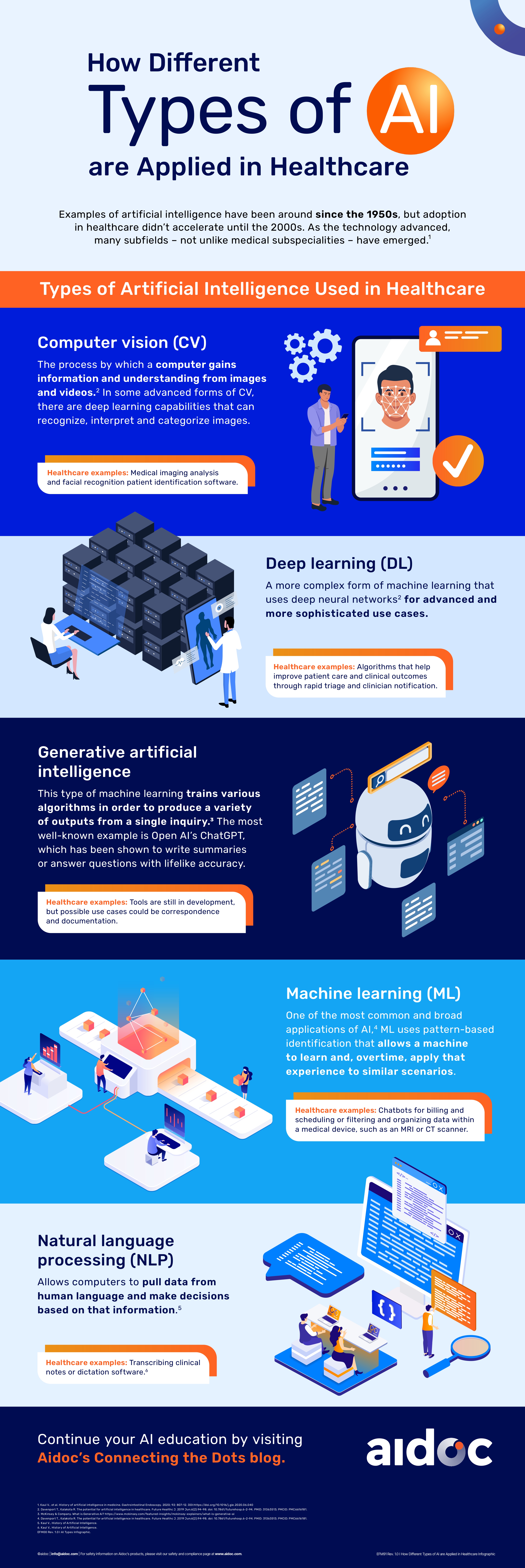There is a wide range of options available from AI healthcare companies that are striving to make an impact on the future of clinical care. As technology becomes more popular and integrated into clinical workflows, its ability to influence triage and clinical outcomes becomes more apparent.
With so many options to choose from and new terms to understand, we have put together a list of questions that can help guide you (and potential AI partners) as you embark on this journey.
What Is the Medical AI Company Landscape Like?
There is a plethora of healthcare AI companies, each offering their own unique benefits and improvements to workflows. When we talk about “health AI companies,” this can include AI designed for various subspecialties such as:
- Conversational AI/Bots
- Surgical robotics
- Cybersecurity
- Fintech and Insurance
- Text analysis
- Diagnostics
For more details on the types of AI used in the medical field, refer to the infographic below:

How Can I Figure Out My Use Cases for AI?
AI offers health systems a significant promise: the ability to streamline clinical workflows and ultimately improve patient outcomes. To fulfill this promise, health systems need to determine why AI is suitable for them and what metrics they want AI to impact. This should guide how AI is utilized within the health system. Here are some examples:
Optimizing Radiology Workflows
Radiologists play a central role in many clinical AI activities, making the field a testing ground for how an AI-enabled read room can benefit patients and health systems in various ways:
- Quicker analysis and prioritization of scans, leading to faster diagnosis
- Increased accuracy, leading to better sensitivity and specificity
- Enhanced workflow efficiency and reading time, resulting in faster throughput
- Identification of incidental findings, leading to more appropriate interventions
Reducing Time to Diagnosis
Reducing read time not only improves workflow efficiency but also helps alleviate radiologists’ burnout. AI that is integrated into clinical practices has been shown to reduce read times and address challenges related to radiologist shortages and increasing imaging volumes.
Improved Turnaround Time
Staffing shortages in radiology and other clinical departments underscore the need for accurate and timely information that can prompt immediate action. AI-supported triage can optimize patient care by reducing report turnaround time, improving emergency department efficiency, and enhancing time to treatment.
What Should I Consider When Choosing an AI Partner?
Health systems must carefully evaluate their next steps in the AI journey, focusing on the quality of their relationship with their AI partner. While each health system’s needs may vary, here are three key questions to keep in mind when evaluating medical AI companies:
- Market Traction: Does the company have a proven track record of successful algorithm deployment? Their solutions should be based on established use cases.
- A Comprehensive Roadmap: AI is constantly evolving, so a reputable medical AI company should have a roadmap for future developments.
- Seamless System Integration: To realize the full value of AI, it must be deployed at scale through an enterprise-wide platform that integrates multiple service lines and systems for a seamless user experience.
What Should IT Consider When Assessing Healthcare AI Companies?
Once you have identified use cases and evaluated AI vendors, it’s essential to consider IT aspects. The following questions can help gauge an AI vendor’s capability in delivering on the promises of healthcare AI:
- How does your system automatically match algorithms to potential findings?
- Can suspected positive findings be communicated in real time to relevant stakeholders across departments and facilities?
- Is AI continuously monitored for performance and data drift, and how does the company address this proactively?
Healthcare AI Companies Moving Forward
Choosing the right healthcare AI company requires thorough scrutiny to ensure the best fit for your health system. By considering use cases, key metrics, AI partner criteria, and IT needs, you can lay a solid foundation for your AI journey. Experts predict consolidation in the healthcare AI industry as the technology becomes more prevalent in clinical workflows, emphasizing the importance of a platform approach for long-term AI strategies.
Stay informed about current clinical AI trends and insights by exploring Aidoc’s AI Learning Center, offering a wealth of educational resources.


